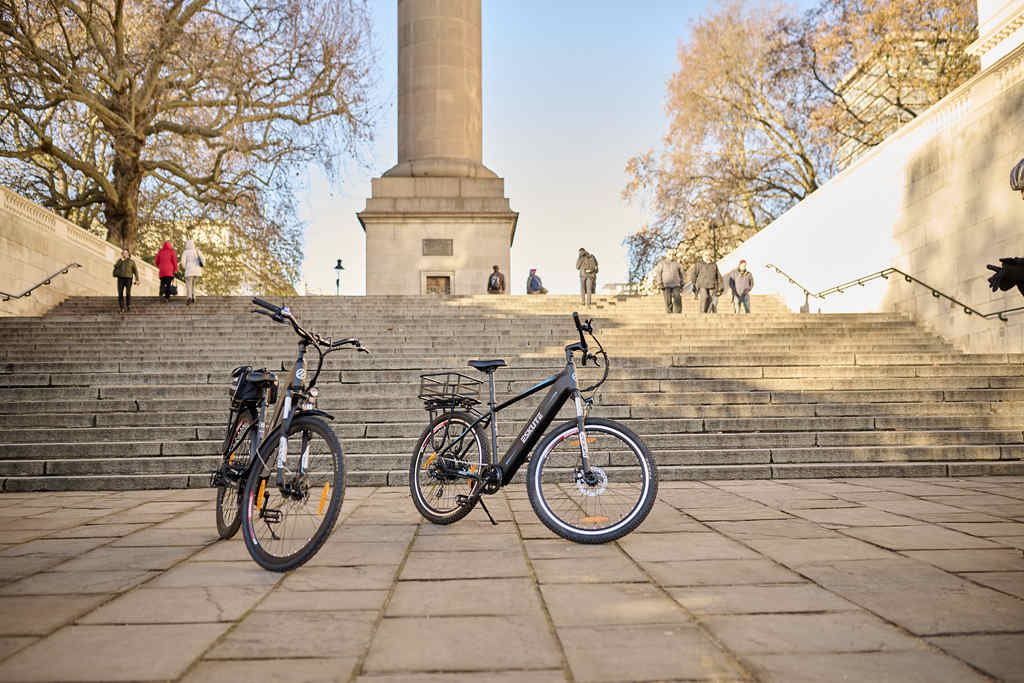Navigation
The popularity of electric bikes in recent years has exploded due to the recent pandemic and a worldwide trend towards opting for more environment-friendly options.
E-bikes are a more convenient, healthier, and cheaper way of commuting daily and on long trips. They also have a much lighter carbon footprint, which makes you do all that and be better towards the environment.
However, with the sudden rise in their popularity, many people who aren't that properly educated about the nitty gritty of e-bikes are now interested in buying them.
There's nothing wrong with that; in fact, when it comes to e-bike enthusiasts, the more, the merrier.
One such topic that many people aren't properly educated on is the difference between the types of brakes used in an electric bike. The type of brakes is almost always one of the top specifications on any e-bike website.
In this article, we'll go over the details of what a brake does (more of a refresher, perhaps), as well as discuss the differences between the two most common types of brakes, mechanical and hydraulic.
Hopefully, by the end of this read, you are fully aware of the differences and can personally make an informed decision regarding the brake you want in your electric bike.
Eskute has a wide range of e-bikes available, mostly with mechanical brakes (which can be upgraded to hydraulic if you want to). It might be a good idea to visit the site to develop a practical understanding of the topic and put your knowledge to use.

How do mechanical and hydraulic brakes work?
Mechanical brakes
The science behind mechanical discs/brakes is relatively straightforward. A lever on the brake calliper is pulled when you press the brakes. When moving the brake pads, presses them onto the tyre and reduces the bike's speed.
The main flaw is that it relies on mechanical stimulus alone, and especially on larger bikes, there's a large gap between the brake pedal and brake pads.
As a result, this drag and energy are wasted, and it takes a few milliseconds before the power reaches the brake pads.

Hydraulic brakes
On the other hand, hydraulic brakes are more complex and need to be understood properly.
They utilize the power of fluid mechanics to ensure that no power is wasted, and the power applied on the brake pedals gets transferred fully towards the brake pads.
How does that happen? Unlike a mechanical brake, hydraulic brakes transfer power through a non-compressible fluid. Since no cable is involved, no power is lost to friction; that's the case with mechanical brakes.
It means that when you press the brake pedal, it exerts a force on a piston and forces it to move. This piston makes the fluid adjacent to it, travels through a hose (which is also virtually non-expandable), and exerts a force on a piston on the other end.
Sometimes the piston's surface on the brake pads end is slightly smaller than the piston where force is exerted, amplifying the force applied on the brake pad and making it even stronger than the one applied.

Pros and cons of mechanical and hydraulic brakes
Let's discuss the crux of the article and where each type excels and doesn't.
The best feature favouring mechanical brakes is their low cost. Not only are they cheaper to buy, but it's also cheaper for anything that requires repair.
Since it's also the most common type of brake, there usually won't be an issue with repairing or replacing it, no matter which part of the world you live in.
The major cons are that their performance is nowhere as close to hydraulic brakes, and regular maintenance is necessary for their proper functioning.
Moreover, there's a marked difference in the performance of different mechanical brakes, even those in a similar price bracket.
So you should be extra careful about the particular mechanical brake you choose, and either confirm with a professional biker or thoroughly read reviews before making a purchase.
Hydraulic bikes, on the other hand, just beat mechanical bikes on almost all levels. Apart from the added cost, and occasional maintenance trouble, they really don't have any cons.
They might be hard to get if you live in an area that is remote to a bike maintenance store; however, once you have them installed on the bike, you rarely need to tinker with them to keep them running.
Hydraulic brakes have a much more sophisticated working mechanism and even self-adjust for pad wear. It means that, unlike mechanical brakes, you don't need to make changes as the brake pads thin manually; the brakes take care of it automatically.
They're more powerful and more efficient. The lesser hand effort required makes them an excellent choice if you intend to use your electric bike for long and arduous journeys.

Who are hydraulic brakes for?
After discussing the pros and cons, it can be safely established that hydraulic brakes are superior in most aspects, apart from their much higher cost.
However, better doesn't always mean that it's the best choice for you. As mentioned earlier, despite low maintenance, when hiccups arise, they're more painful to deal with than mechanical brakes.
Moreover, what if you don't utilize the higher power of the hydraulic brakes? In that case, there isn't any advantage of having them over the mechanical ones, and you're throwing money away, which could be better spent on some other component.
While theoretically, anyone can use and take advantage of hydraulic brakes, they're much more suited to a particular set of people.
Those experienced bikers intend to go on long trips (maybe dangerous and adventurous). Hydraulic brakes are for those e-bike enthusiasts who might need that extra braking power on their rides.
However, for most regular riders, mechanical brakes would do just fine, which is especially true for those who are on a budget and want to choose an electric bike at a lower cost.
While it's a nice added plus, hydraulic brakes aren't necessary for a comfortable and safe journey on an e-bike.

Summary of Features
If you're bored by the blocks of text, a visual aid might be helpful. You could also revise what we've discussed so far with the help of this or show your friend the article's summary at a glance.
Here's a table with all the pros and cons of mechanical versus hydraulic brakes compared. If there's one thing you skim from this article, it should be this.
Table: Comparison of Mechanical versus Hydraulic Brakes
| Features | Mechanical | Hydraulic |
| Maintenance | Regularly required | Rarely, once it's setup |
| Weight | Heavier | Comparatively lighter |
| Braking Medium | Cables | Fluid |
| Performance | Less sensitive and effective | More effective, frictionless |
| Price | Economical | Expensive |
Conclusion
Shortly, if you're on a budget and just want to use your electric bike for casual use, perhaps in the city, then mechanical brakes should be good enough for you. If you're a more avid rider and need the power hydraulic brakes offer, go for them.
Regardless of the type of brakes you choose, buying your electric bike from a trustworthy vendor is more important. One such place is Eskute, which has been providing e-bikes at reasonable prices for years.
Visit Eskute's website to choose from an impressive range of electric bikes, with all features listed clearly and comprehensively. Use the reviews hundreds of previous customers have left behind to make an informed decision. Happy riding!










Leave a comment
This site is protected by hCaptcha and the hCaptcha Privacy Policy and Terms of Service apply.